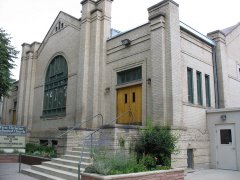But the other thing I remember about communion is peering at the shiny silver trays as they passed me by. Sometimes I would get to touch them or help pass them. But usually not. In the CRC in which I was raised, the Lord's supper was something for adults. Children were not invited.
As I'm sure many of you know, discussion in recent* years in the CRC has suggested that we change that. Synod has now suggested that it's okay--even important--for children to participate in the Lord's Supper. But this makes some of us (understandably )nervous. After all, we've "always" done things this way. And if was good enough then, why isn't it good enough now?
Well, I have my own answers to that question. But I'd like to help all four of you who read this blog come to your own conclusions. So here are some questions I think you need to answer for yourselves in order to develop a theologically informed position on this matter.
- Our discussion ought to start with baptism: What actually happens to a child in baptism? What's the main event? How does baptism relate to membership in God's family (if at all)?
- What is the relationship between baptism and communion?
- What are some of the central "happenings" in the Lord's Supper (I assume there is more than one)? Is it primarily an act of remembrance on our part? A way for God to nourish us? Something else?
- To phrase the previous question another way: who is the primary actor in the sacraments? Is the Lord's Supper (and for that matter, Baptism) something that God does for us, or something that we do for God?
- What is the relationship between the "old" signs of the covenant (i.e. circumcision and the Passover Feast) and the "new" signs of the covenant (Baptism and the Lord's Supper). Does the place of children in these "old" ceremonies suggest anything about their appropriate place in the "new"?
- What "body" is Paul referring to in 1 Corinthians 11? How might reading this passage as referring to the "body of believers " affect what we do at the table?
- How does the gift of the Lord's Supper strengthen us and build us up as followers of Christ? How might it do the same (or be different) for our children?
I think this ought to be enough to get you started. If you'd like to read what (I think) are some well thought out answers to these questions, as well some questions you may not have thought to ask (like the history of this issue) check out the latest issue of the Calvin Seminary Forum. (Also available at church. Ask me if you'd like a copy.)
*Walt A. , our expert on all things syndoical and church order, informs me that this discussion has actually been going on for over twenty years. That's long enough that I actually could have participated in the Supper as a child if my church had been up to speed on the latest Synodical decisions.

5 comments:
Only 4 of us? come on, I have recruited at least one other reader--
you've even got readers way across the country thanks to links from ang and ryan! i found it interesting that i have almost the same childhood memories and impressions of communion as you do... i know we grew up in similar churches, but interesting that we came away with the same impression of unity in the body during that moment of eating and drinking together... i also remember the pastor passing the trays to the elders in the front of church as a sort of ceremonious event...
Was it good enough then? I don't know but the question has to asked and the answer never assumed. Seeking an answer that is based on scripture may at least help us better understand the wonder of the sacrament, regardless of the answer. I agree,the latest issue of the Calvin Seminary Forum is worth reading for the reasons that you stated. Please keep posting.
By the way, I've come up with the names of many more readers than the number of responses to your posts reflects. You have to remember that you know a lot of shy people who find the idea of responding to something like this a bit of a self-confidence stretch.
I was reading one of the forms (in the back of the Hymnal) for Baptism and found an interesting statement:
"Our children should not be denied the sacrament of baptism because of their inability to understand its meaning." (page 957 in the grey book)
What if we applied this to the Lord's Supper, like so:
Our children should be denied the sacrament of the Lord's Supper because of their inability to understand its meaning.
I know, I know, that's way too far down the slippery slope. But from someone who did not believe in infant baptism and now does, that's what it seems like.
I dunno, Kevin...that seems like very good logic to me (not to far down any slippery slope). Seems to me that if we only received grace when we fully understood things, we'd be in big trouble...
Post a Comment